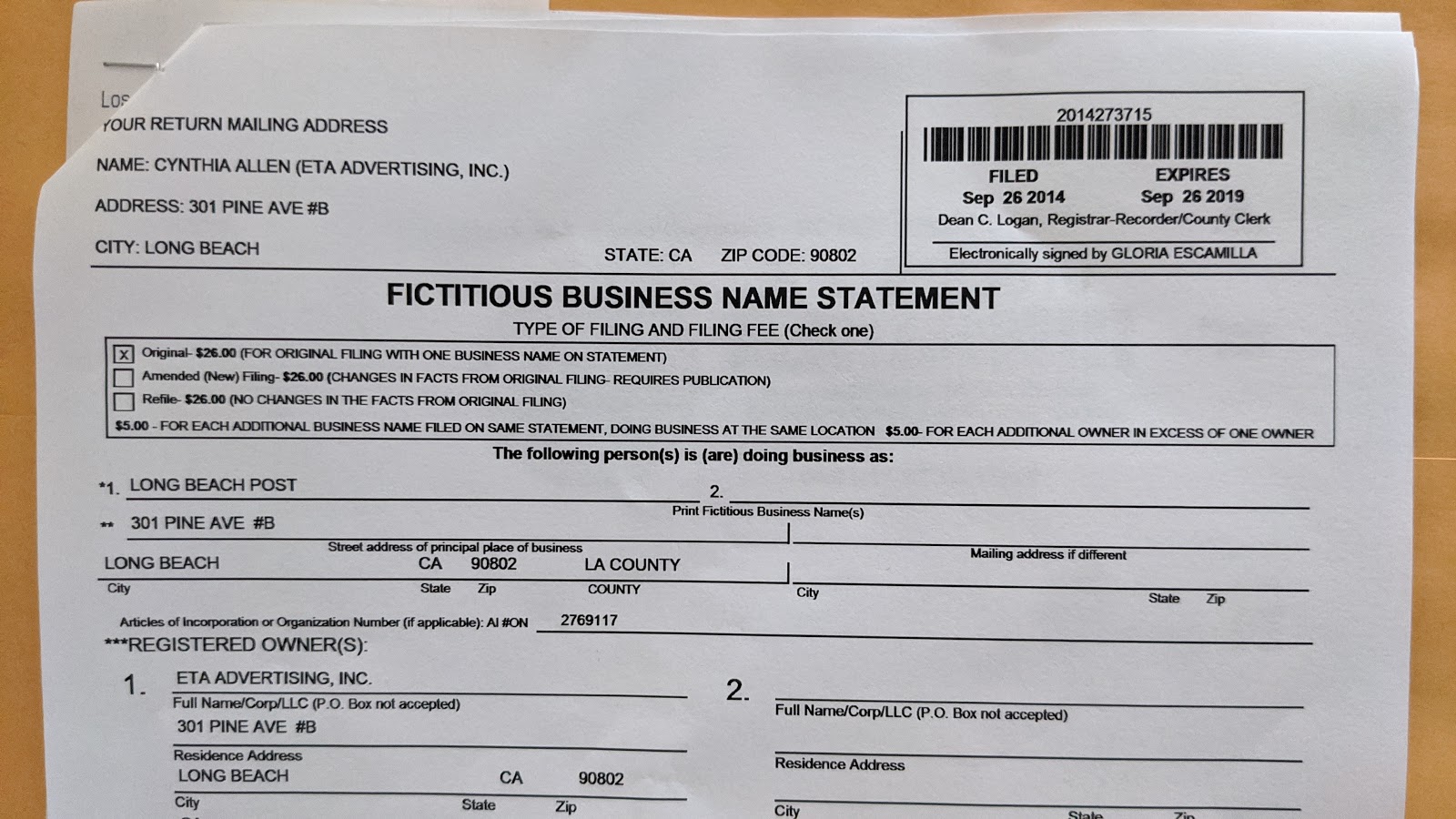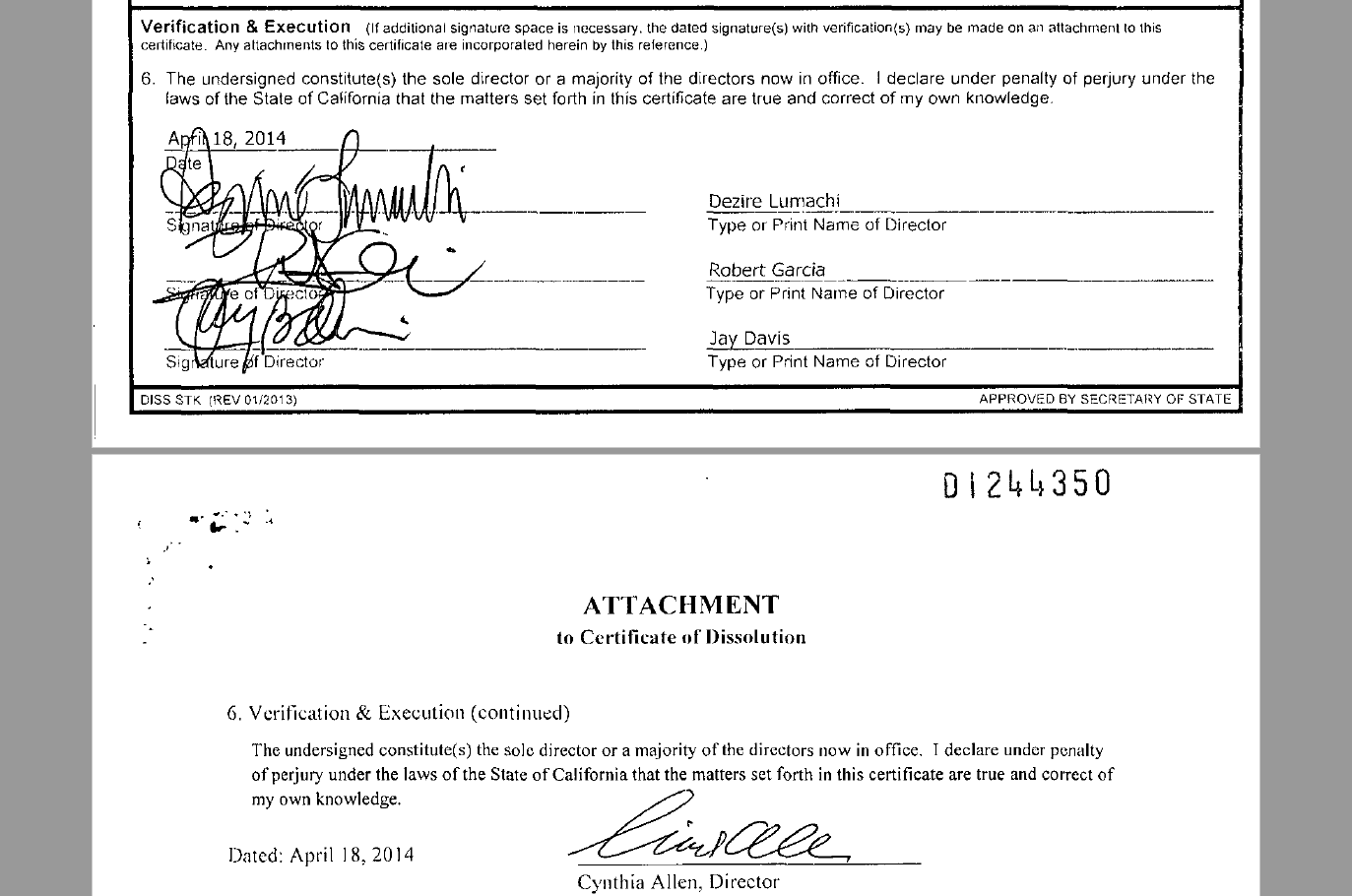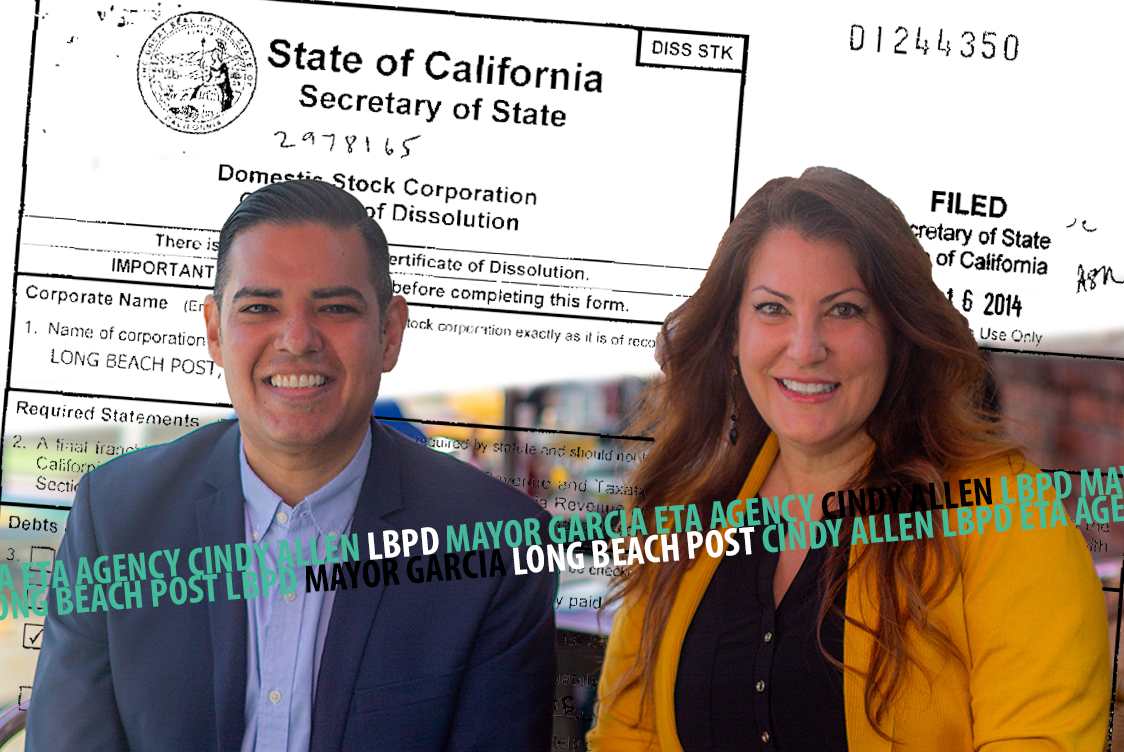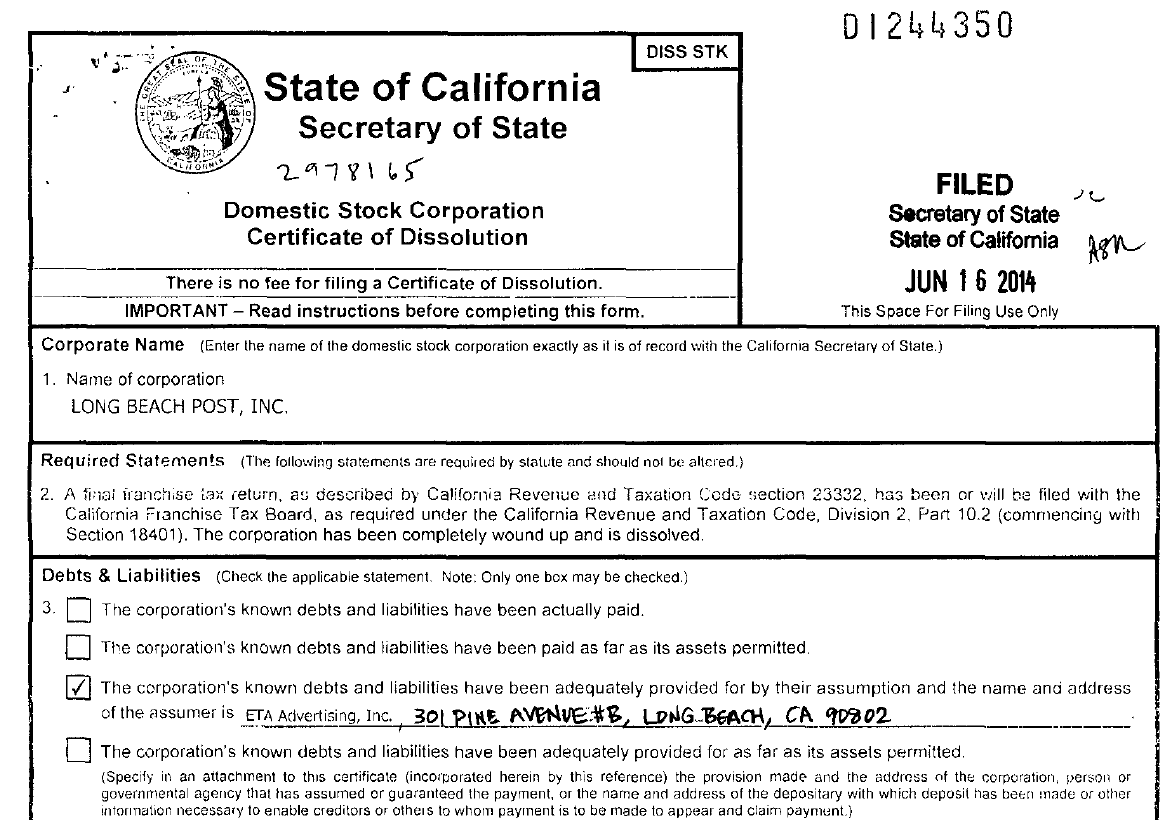Cindy Allen’s Ad Firm Received Police, Mayor, and City Money While Doing Business As the Long Beach Post
8 minute readA review of public documents shows that from 2014 to 2018, after Mayor Robert Garcia and others transferred the Long Beach Post to Cindy Allen, her ad firm operated the media outlet as a DBA while receiving thousands of dollars from the mayor’s political committees, and hundreds of thousands more in city government contracts, including $96,150 from the Long Beach Police Department.
Allen is currently a candidate for the Second District City Council seat against Robert Fox. The two have been unable to escape accusations of dishonesty and foul play, and the public discourse accompanying the campaigns has unfortunately kept pace with the candidates’ muddy footprints.
This latest series of facts introduces even more concerns about Allen, including the ethical implications of simultaneously being president of ETA Advertising while it received city, mayor, and police money, and publisher of the Post while it was reporting on local politics.
THE POST IS A LEGAL FICTION
While Allen’s former publisher/owner position with the Post has been acknowledged, lost has been the link that connected the two. Allen did not simply own the Post outright as a separate business from her ad firm. Instead, she was president of ETA Advertising, which itself was “Doing Business As” (DBA) the “Long Beach Post.”
DBAs are not legally separate entities from the corporations or individuals who use them. DBAs do not have tax identification numbers; nor do they have assets or employees. A DBA is just a nickname for another business.
In this case, it was ETA Advertising that had employees, assets, and a legal existence—not the Post. The “Long Beach Post” was just a nickname the ad firm used when it published news. Post and ETA employees even worked out of the same Pine Avenue office.

The 2014 fictitious business name statement documenting that ETA Advertising could now do business in public as “Long Beach Post.”
While one team in the office was being led by Allen to design and run ads for elected officials and government institutions, the other team was being led by Allen to publish stories about elected officials and government institutions.
Today, the Post is a DBA of Pacific Community Media (PCM), which is itself a subsidiary of the real estate speculation firm Pacific6. In this case, PCM is a separate entity that legally exists and “Does Business As” the “Long Beach Post.” PCM filed “Long Beach Post” as a fictitious business name (DBA) in August 2018.
But back when Allen was running things, there was no separate, legally extant, subsidiary company. It was just the Post as a DBA of ETA Advertising itself—meaning any subsequent government contracts acquired by ETA went to the company while it was legally indistinguishable from the Post. Similarly, if any lawsuit had been brought on ETA Advertising during this period—similar to the recent one against Allen—it would have taken the Post down with it.
In fact, legally speaking, there was, and is, no Long Beach Post. It turns out the Post was dissolved in 2014 at the time of its transfer to ETA.
Allen’s firm thereafter controlled the Post as a DBA, doing some of its business in public as “ETA Advertising,” and other bits of its business in public as the “Long Beach Post.”
When it accepted government contracts, for example, it was “ETA Advertising.” But when it reported on the government, it was the “Long Beach Post.”
When it accepted LBPD contracts, it was “ETA Advertising.” When it reported on the police, it was the “Long Beach Post.”
When it accepted money from Garcia, it was “ETA Advertising.” When it reported on Garcia, it was the “Long Beach Post.”
We reached out to Allen to ask for more information about the relationship between ETA Advertising and the Post when the two were one in the same. We have yet to receive a response.
Tomisin Oluwole
Face the Music, 2022
Acrylic on canvas
24 x 36 inches
Click here to check out our interview with Tomisin Oluwole, a literary and visual artist based in Long Beach.

Instead of gunking up our site with ads, we use this space to display and promote the work of local artists.
We also contacted multiple former Post employees who worked under Allen, but have yet to receive a response.
CINDY AND THE CITY
A good place to start this entanglement between Allen, Garcia, the city, and the Post is 2014. LBReport’s Bill Pearl reported that ETA Advertising performed almost $11,000 worth of services for Garcia’s mayoral campaign that year—and that the amount was later written off as an “overestimate,” meaning Garcia’s committee did not have to pay the sum.
Garcia won the election, and shortly after dissolved the Long Beach Post, transferring the media organization’s debts and liabilities to Allen’s ETA Advertising. At the time, Garcia—a sitting councilmember who had just been elected mayor—was still also a director of the Post. His signature appears on the 2014 dissolution form.

Garcia’s name is listed as a director and his signature appears on the 2014 dissolution form. Allen’s signature appears at the bottom.
Following Garcia’s election to mayor that year, and his transfer of the Post to ETA Advertising, ETA set up the “Long Beach Post” as a DBA, and the firm later received its first Long Beach city government contract, worth up to $160,000.
The next year, ETA received an amended contract worth up to $185,000; and for the next few years, the ad firm continued to work with the city while simultaneously doing business as the Post.
FORTHE contributor Greg Buhl, as part of his research for an ongoing series on the LBPD’s use of surveillance technology, also uncovered through public records requests that, from 2016 to 2017, ETA Advertising received almost $100,000 worth of contracts specifically from the Long Beach Police Department. This was while Allen’s husband, Randy Allen, was still an LBPD Commander.
Throughout this period, campaign finance forms reveal that Garcia’s committees were themselves purchasing campaign services from ETA Advertising, even as the company was operating in public as the “Long Beach Post,” and reporting on Garcia.
And just this week it was revealed that the individuals Allen sold ETA Advertising to are now suing her for misrepresenting her business during the sale. The documents released with the lawsuit show that Allen’s sale contained a clause that she would continue to receive 10% of the firm’s future profits.
A list of ETA’s past and present clients has also been made public, and it names myriad Long Beach government departments: the Water Department, the Port, the Economic Development Department, the Long Beach Community Foundation, and more. The firm also worked with the Downtown Long Beach Business Association, and several elected officials, including the mayor and the city prosecutor—again, all while operating the Post as it reported on the local government.
QUESTIONABLE COVERAGE
This raises many questions about the “Long Beach Post”—both at present, and also during the years it was legally indistinguishable from an ad firm which was being partly funded by the mayor, the city government, and the police.
The Post continues to publish about both Allen and ETA, sometimes without any acknowledgements. When they do disclaim anything, they mention Allen, but fail to mention ETA Advertising. Nor do they inform the reader that ETA Advertising received money—by the Post’s own counting, $1.4 million since 2015—from myriad government sources while it operated as the “Long Beach Post.” This Post story from August, for instance, concerned the second sale of ETA Advertising, yet it contained no mentions about the Post’s relationships with ETA or Allen.
I sent some of the questions I had about these connections, and the lack of information on them, to Allen when I began work on this article. You can read them below:
- How did ETA Agency handle potential conflicts of interest as it received public funding?
- What policies were in place internally for ETA and the Post, respectively? What policies were in place between the two? Can I see copies of those policies?
- Were any disclaimers given while reporting on the local government?
- How much of the government contract money made its way to the Post? Can we see receipts for where that money went?
- Can I see the terms for which the Post was sold from ETA to Pacific6 in 2018?
Allen has not responded to multiple requests from FORTHE during this election cycle, but has appeared multiple times in the Post—including recently to claim Beachcomber journalist Stephen Downing is working with her campaign opponent, prompting Downing to defend himself.
It’s just one of the latest, ugly developments in her bid for the Second District council seat, leaving Allen facing more questions than ever about her own connections to Mayor Garcia, ETA Advertising, the LBPD, and the “Long Beach Post”—including the big question of whether or not those connections are truly behind her.




 andrew@forthe.org
andrew@forthe.org




